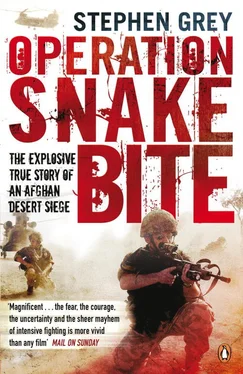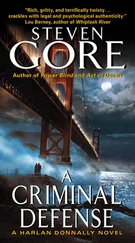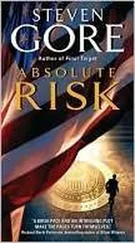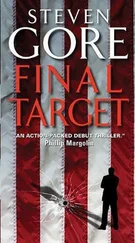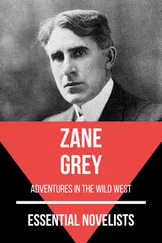Afghan officials were spouting public outrage. President Karzai’s spokesman, Humayun Hamidzada (whose salary, ironically, was paid by the UN), told a news conference two foreigners were under arrest for ‘posing a threat to national security’. Wafa declared to foreign nations: ‘It is our duty to defend our dignity,’ and he could not ‘allow anyone to carry out political activities without the government’s permission.’ In Ireland the expulsion of two Irishmen beat the Pope’s Christmas message as the top news story.
It was not only the end of Semple’s activities and the training camp plan. The whole programme of discreet contacts with Taliban commanders was now suspended. On Boxing Day, Mullah Qassim and his deputy from ‘the Group’ in Gereshk were summoned to see the governor and arrested. The militia was disarmed and placed under house arrest in Gereshk.
When Captain Rob Sugden heard the news, he phoned up Lieutenant Colonel George Waters, his commanding officer in the Coldstream Guards and the brigade’s security sector adviser.
‘Fuck, fuck, fuck,’ said Waters, when he told him of the Group’s arrest.
It did not sound like reassurance. Sugden had been watching Sky News , and he heard Gordon Brown’s denial that the British were negotiating with the Taliban.
‘Are we all going to end up in court?’ said Sugden.
‘If you are then I’ll be joining you there,’ said the colonel.
Even less reassuring, thought Sugden. His experiment at least for now was over.
Cowper-Coles got back to Kabul on 28 December and saw President Karzai in the palace the following day. The ambassador had brought with him a sheaf of emails: from both the Ministry of Interior and the NDS. Semple had exchanged more than 100 messages on his work with the NDS alone. They showed how the contacts with the Taliban and the plan for the camp had been directly approved by Karzai’s own most senior officials . ‘This has all been authorized,’ Cowper-Coles told the president, who looked taken aback. All his men had denied all knowledge.
But, however much he squirmed in his seat, the Afghan president was not about to back down, not even over his expulsion of Patterson, who had nothing to do with the camp plan or any contacts with the Taliban. As one diplomat put it, Patterson was just collateral damage in a ‘perfidious strike’ by Karzai.
Even before the Helmand governor rang Karzai talking of ‘British plots’, tension was already growing between the president and British diplomats. Much of it centred on a plan to appoint the former Royal Marine and Liberal Democrat leader Lord Ashdown as a new UN ‘super envoy’ to the country. Ashdown has a reputation for breaking china and for speaking bluntly. He had already declared the Afghanistan war as lost, saying success was ‘now unlikely’. Everyone gave Karzai contradictory advice. Being plagued by ‘mentors’ was the story of his life. While President Bush was strongly backing Ashdown, some of his own advisers, including Zalmay Khalilzad, the influential Afghan-American US ambassador to the UN, were said to be warning Karzai that Ashdown would become a dominating ‘viceroy’. Paradoxically, Ashdown had been a US idea, not a British one. In the end Karzai came to see the imposition of Ashdown as British power play, and Semple’s ventures gave him the excuse he was looking for to vent some of his frustration.
In the weeks that followed the expulsions, what finally sealed Karzai’s rejection of Ashdown was a leading article in The Times of London that described the president’s ‘precarious position’ and how he had ‘little say in security matters’ and called him a ‘lonely Pashtun in a government made up largely of Tajik veterans of the Northern Alliance’. A day later a Times news article suggested Lord Ashdown was the solution, quoting an Afghan businessman as saying, ‘He is the last chance to save Afghanistan. I pray that it is him who will run our country, and not our useless president, who has so far managed to squander the best opportunity Afghanistan has had in 250 years.’ [21] Nick Meo and Richard Beeston, ‘Lord Ashdown Called in to Overhaul Reconstruction of Afghanistan’, The Times , 17 January 2008.
Bill Wood, the US ambassador, pleaded with an incensed Karzai: ‘You don’t give your word to Bush and then go back on it just on the basis of a Times leader, which Ashdown had nothing to do with.’
Then, at the World Economic Forum in Davos on 24 January, Karzai blew another gasket – putting into the public sphere what he had been saying in private for a while: that the British and Americans were to blame for the violence in Helmand. The Musa Qala operation was correcting a problem that the British had made for themselves.
Briefing journalists, he said, ‘It took us a year and a half to take back Musa Qala. This was not a failure but a mistake.’ Then he repeated his old point about how the removal of the former governor, Sher Muhammad Akhundzada, had precipitated the violence. ‘There was one part of the country where we suffered after the arrival of the British forces… Before that, we were fully in charge of Helmand.’
Karzai apologized immediately afterwards to Cowper-Coles, Gordon Brown and David Miliband, the foreign secretary, telling the British he never meant to insult their troops. But his calming words did not disguise the fact that relations had yet to recover – and that Karzai was now determined to reject Ashdown, who soon publicly withdrew.
In Helmand, Brigadier Mackay regarded the whole Semple debacle as a major lost opportunity. It undermined ‘so much of the promise opened up by the capture of Musa Qala’, he said. ‘After that, reconciliation was dead in the water.’
There was at least one positive thing that emerged from the debacle. Mullah Omar’s spokesman abruptly announced that he was expelling hardline commander Mansour Dadullah from the Taliban movement – soon after untrue press stories that Semple and Patterson had been talking to him. Dadullah had been treated almost as abruptly and unfairly by his bosses as the men from the EU and UN had been treated by Karzai.
Meeting the Taliban commander Mullah Sadiq at a safehouse, Qais, the journalist, still hoped he could somehow persuade him to stop fighting.
Sadiq was candid with him about his doubts. But, for all that, Qais knew that this man could be ruthless.
‘This country needs blood. It is a war. I need to be martyred,’ he would say.
‘You have lots of children. And they are all young. They need you,’ pleaded Qais. He could not help wanting to persuade Sadiq to end his brutal ways. But Sadiq said he wanted his eldest son to join the fight and be martyred too.
Sadiq had a role in the Taliban’s counter-intelligence. He was a spy hunter. In Musa Qala he had identified two spies, who had been hanged. He had hanged two more in Sangin. ‘I’m 100 per cent sure they were guilty!’ he said, although it was in a tone of voice that made Qais think he had doubts. ‘They had satellite phones, expensive equipment. They got rich all at once!’
Qais used to tell him bluntly, ‘I think that’s wrong. You don’t know for sure.’
All this time Sadiq kept his home in Sangin and returned frequently to visit his wife and family. He did this right to the end – even with British troops back in the town and even as he rose up the ranks of Taliban commanders.
They began arguing about the taking of hostages. Some journalists had been killed by the Taliban, and Qais was furious. Some Koreans had been taken prisoner and released for cash. Sadiq said kidnapping for ransom was becoming an ugly business now. ‘Now the Taliban will kidnap their mothers for money,’ he confessed.
Читать дальше
